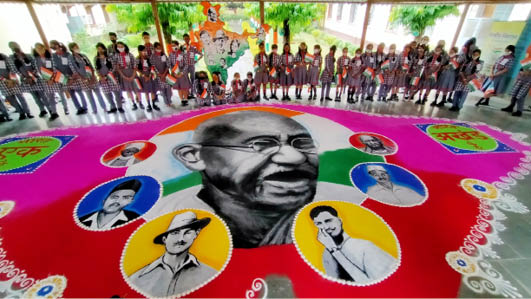For me the past week has been one of despair and disgust. To divert my mind from the prevailing political muck, I am re-reading D.G. Tendulkar’s volume two of his biography of the Mahatma.
I am writing this on Mahatma Gandhi’s one hundredth and fifty second birth anniversary. Had he been alive today, he would probably have committed suicide seeing the present state of the Congress party. Three individuals have all but made the Congress non-functional. I doubt if any member of the so-called high command has read Gandhi’s “The Story of My Experiments with Truth”.
For me the past week has been one of despair and disgust. The Bhartiya Janata Party must be in a joyous mood. It has no worthwhile or effective opposition to face. This is not a comforting development for our democracy.
To divert my mind from the prevailing political muck, I am re-reading D.G. Tendulkar’s volume two of his biography of the Mahatma. It was published in 1951.
Gandhiji was arrested on 10 March 1922 at the Sabarmati Ashram. The offence was his writing three articles in “Young India” of which he was editor. His trial began on Saturday, 18 March, before Mr. Broomfield, I.C.S, the District and Sessions Judge, Ahmedabad.
The charges were read out. Gandhiji said, “I plead guilty of all charges.”
Judge: Mr. Gandhi, do you wish to make a statement?
Gandhi: I would like to make a statement.
Judge: Could you give me in writing to put it on record?
Gandhi: I shall give it as soon as I finish reading it.
Before reading his written statement he spoke ex-tempore. I quote para two: “I wanted to avoid violence. Non-violence is the first article of my faith. It is also the last article of my creed. I had either to submit to a system which I considered had done irreparable harm to my country or incur the risk of the mad fury of my people bursting forth. I know that my people have sometimes gone mad. I am deeply sorry for it and I am, therefore, here to submit not to a light penalty, but to the highest penalty. I do not ask for mercy. I do not plead any extenuating act. I am here, therefore, to invite and cheerfully submit to the highest penalty that can be inflicted upon me for what in law is a deliberate crime, and what appears to me to be the highest duty of a citizen. The only course open to you the judge, is, as I am going to say in my statement, either to resign your post or inflict on me the severest penalty if you believe that the system and law you are assisting to administer are good for the people. I do not expect that kind of conversation. But by the time I have finished with my statement, you will perhaps have a glimpse of what is raging within my breast to run this maddest risk which a sane man can run.”
Judge Broomfield, before he gave his verdict, conducted himself in an un British manner: “Mr. Gandhi, you have made my task easy in one way by pleading guilty to the charge. Nevertheless, what remains, namely, the determination of a just sentence, is perhaps as difficult a proposition as a judge in this country could have to face. The law is no respecter of persons. Nevertheless it will be impossible to ignore the fact that you are in a different category from any person. I have ever tried or am likely to have to try. It would be impossible to ignore the fact that in the eyes of millions of your countrymen, you are a great patriot and a great leader. Even those who differ from you in politics look upon you as a man of high ideals and of noble and of even saintly life… it is my duty to judge you as a man subject to law…”
Judge Broomfield recalled the six-year sentence passed against Bal Gangadhar Tilak. He gave Gandhiji also a six-year sentence. He concluded with these large-hearted words: “And I should like to say in doing so that if the course of events in India should make it possible for the Government to reduce the period and release you, no one will be better pleased than I.”
Gandhiji replied to Broomfield’s courtesy “…so far as the whole proceedings are concerned, I must say I could not have expected greater courtesy”.

